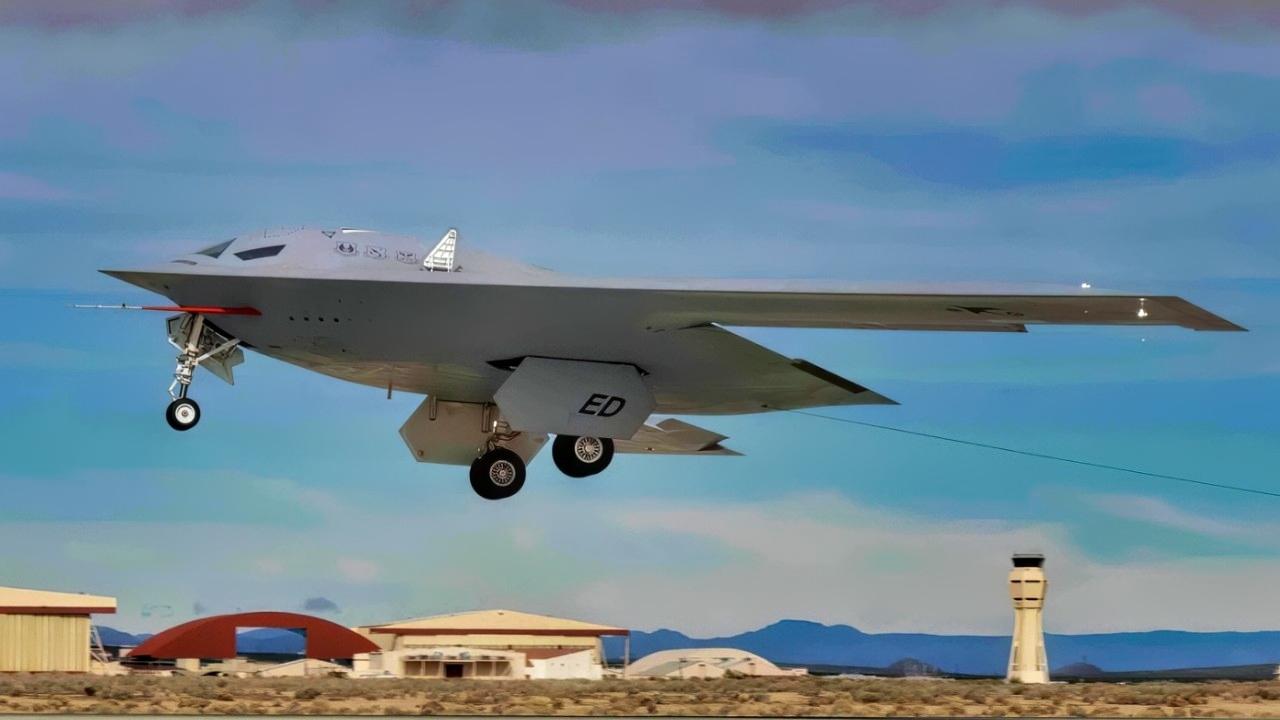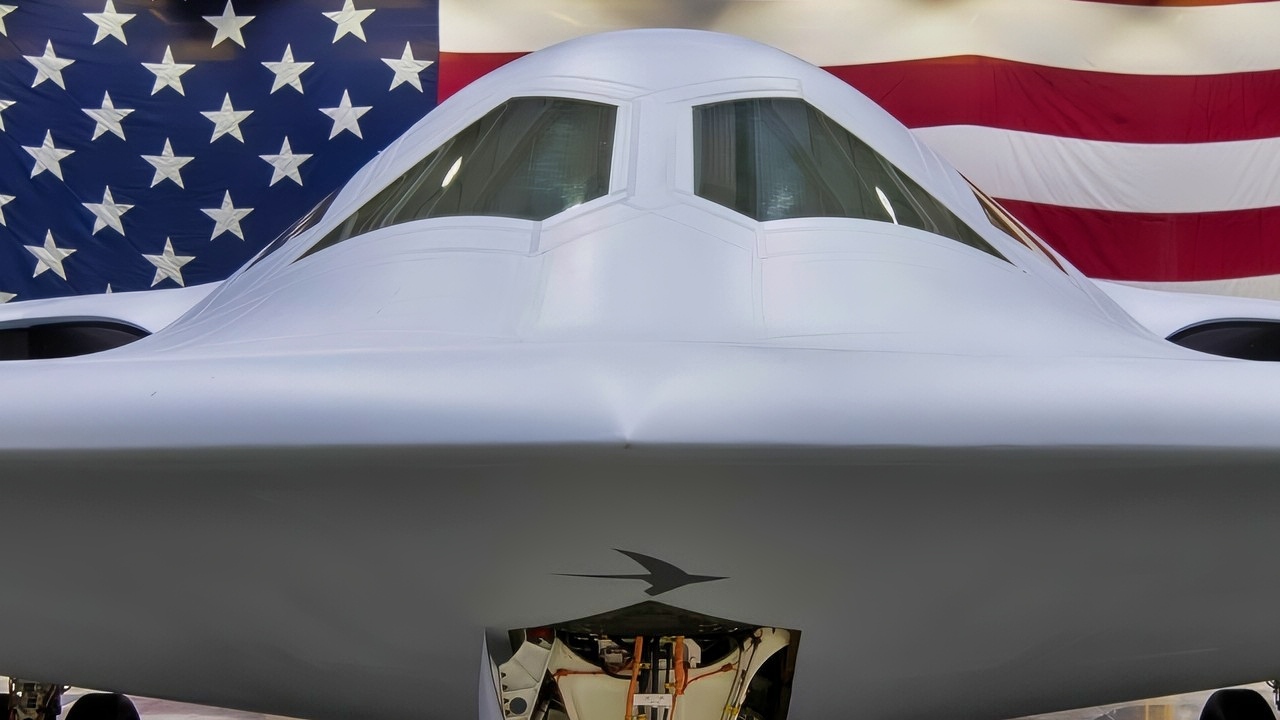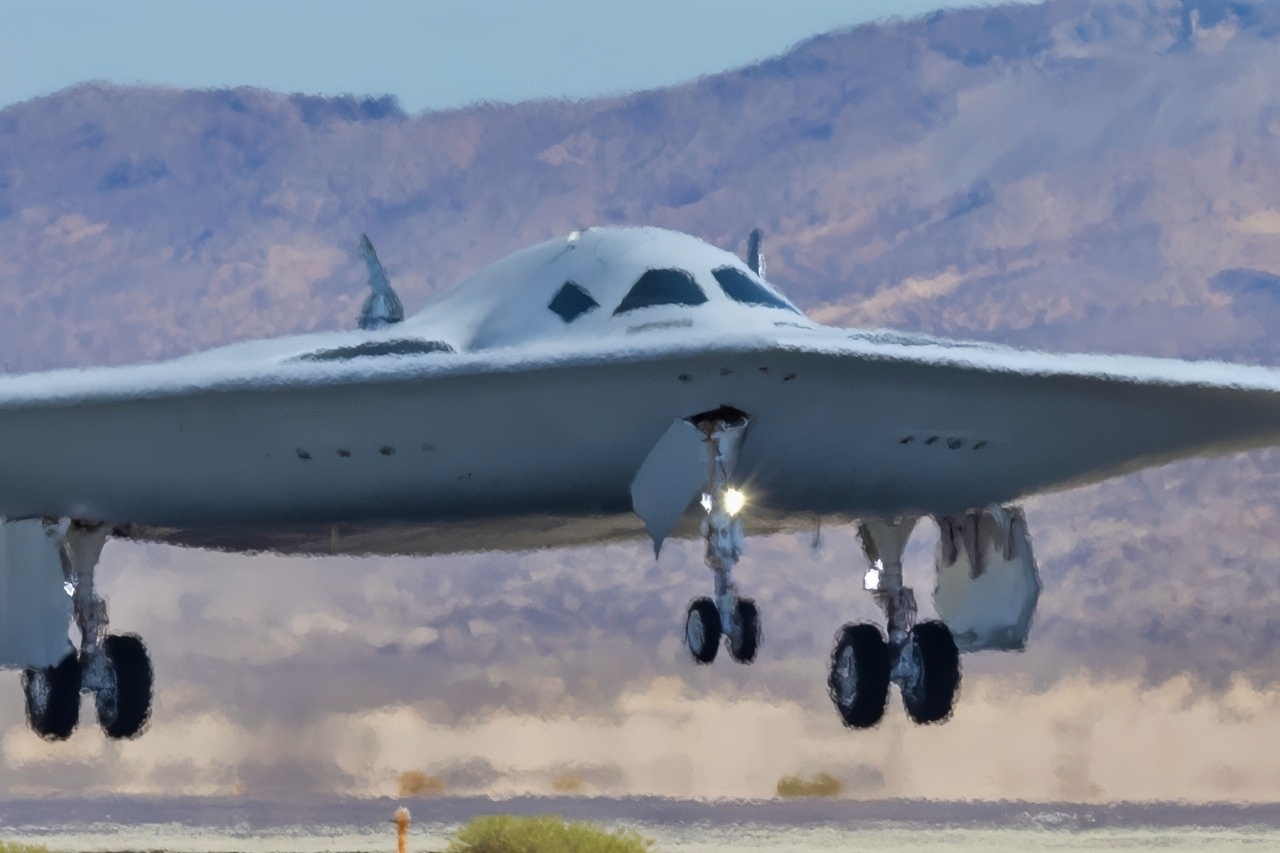B-21 Arsenal Plane or New Build? Inside the USAF Plan for a Stealth Air-to-Air Magazine
Key Points and Summary – The U.S. Air Force is weighing a stealth “arsenal plane”—a flying-wing missileer carrying dozens of air-to-air weapons—to offset China’s fighter mass in a Taiwan fight.

A B-21 Raider conducts flight tests, which includes ground testing, taxiing, and flying operations, at Edwards Air Force Base, California, where it continues to make progress toward becoming the backbone of the U.S. Air Force bomber fleet. The B-21 will possess the range, access, and payload to penetrate the most highly-contested threat environments and hold any target around the globe at risk. The B-21 program is on track to deliver aircraft in the mid-2020s to Ellsworth Air Force Base, South Dakota, which will be the first B-21 main operating base and location for the B-21 formal training unit. (Courtesy photo)

The B-21 Raider was unveiled to the public at a ceremony December 2, 2022 in
Palmdale, Calif. Designed to operate in tomorrow’s high-end threat environment, the B-21 will play a critical role in ensuring America’s enduring airpower capability. (U.S. Air Force photo)
-Rather than dogfight, the aircraft would loiter at standoff range while F-22s, F-35s, and the F-47 cue long-range shots via data links.
-A B-21 variant could do it, but limited Raider numbers argue for a dedicated design or alternative platforms.
-A missile truck complements Collaborative Combat Aircraft by adding affordable magazine depth, leveraging modern AAMs (e.g., AIM-120 variants) and potentially unmanned ops.
-The goal: extend stealth fighters’ reach, saturate enemy formations, and sustain air dominance inside A2/AD.
USAF Eyeing Flying Wing Aircraft Laden With Air-to-Air Missiles
The U.S. Air Force is reportedly considering development of a flying wing arsenal plane (a missileer), which would be designed to carry a payload of dozens of air-to-air missiles, according to The War Zone.
Such a plane has the potential to redefine air combat dynamics. By using a flying wing design, the Air Force would seek to enhance stealth features and operational efficiency—factors that have become vital in a complex threat landscape.
Air-to-Air Combat Over Taiwan Involves Big Risk
Air and Space Forces wrote that China’s growing number of fighter aircraft would be a big advantage in a potential invasion of Taiwan; the Chinese could launch hundreds of fighters without the need for aerial refueling. This would put severe stress on a decidedly smaller number of U.S. fighters, operating at the limit of their ranges.
It is possible that the Air Force is considering a version of the new B-21 Raider for this particular mission. But with the Raider in very limited production capacity, it would limit the already stretched number of B-21s available for existing missions.

The B-21 Raider program is on track and continues flight testing at Northrop Grumman’s manufacturing facility on Edwards Air Force Base, California. The B-21 will have an open architecture to integrate new technologies and respond to future threats across the spectrum of operations. The B-21 Long Range Strike Family of Systems will greatly enhance mission effectiveness and Joint interoperability in advanced threat environments, strengthening U.S. deterrence and strategic advantage. (U.S. Air Force photo)
The Air Force’s exploration therefore may involve other aircraft—perhaps even development of a new one, though this would be technically and monetarily difficult. A former Air Force official told Air and Space Forces that a plane of this kind, with a significant missile arsenal, could supplement or even replace some of the future Collaborative Combat Aircraft drones the Air Force intends to press into service in the coming years.
“There are other ways of achieving ‘affordable mass’ than darkening the skies with CCAs,” the official said, adding, “we haven’t talked about all our ideas in public.” That could mean the Air Force is considering crewed fighters such as the F-22, F-35, and F-47 stealth fighters, as well as the uncrewed Collaborative Combat Aircraft.
Why The Flying Wing Concept?
The proposed uncrewed flying wing arsenal plane is characterized by a distinctive aerodynamic design that eliminates the traditional fuselage and tail. This design not only improves stealth by minimizing the aircraft’s radar cross-section, but it also enhances fuel efficiency and payload capacity.
With a significant number of state-of-the-art air-to-air missiles onboard, the aircraft would be able to engage enemy fighters effectively while maintaining an undetectable profile.
Considering China’s numerical advantage around Taiwan, the Air Force is open to different options. Having a “missile truck” or “missileer” available to friendly air forces in the region would increase flexibility and expand capabilities.
How Will The Flying Arsenal Missileer Work?
The operational scenario the Air Force envisions would involve the missileer aircraft providing additional air-to-air missiles for crewed fighters, such as the F-22, F-35, and the F-47.
The fighters would be responsible for detecting and designating targets, which would then be engaged by long-range missiles launched from the arsenal plane, operating at a stand-off distance. TWZ has actually been floating this type of scenario—featuring a B-21 Raider—for the past two years.
TWZ wrote, “It could find itself overseeing swarms of diverse unmanned combat air vehicles and working as a forward battle manager for other stealthy assets.
“Working as a penetrating intelligence-gathering platform in its own right is also a given. Its weapons will be far more diverse than those of its predecessor, too.
“Electronic warfare-enabled air-launched decoys, defensive and supportive air-to-air capabilities, anti-radiation and extended-range quick-reaction missiles, drone-like air-to-air missile carriers, hypersonic cruise and advanced anti-ship missiles, and more, could find their ways into its weapons bays. Laser weapons or even possibly active protection systems could one day help it defend itself.”
Contemporary missiles are increasingly sophisticated, boasting extended ranges, improved accuracy, and enhanced guidance systems.
The AIM-120 Advanced Medium-Range Air-to-Air Missile (AMRAAM) has undergone several iterations, enhancing its effectiveness in diverse combat scenarios.
A B-21 Raider could carry a plethora of air-to-air missiles, drones, and other weapons, but, as mentioned above, the number of Raiders ordered, 100, is insufficient already.
About the Author: Steve Balestrieri
Steve Balestrieri is a National Security Columnist. He served as a US Army Special Forces NCO and Warrant Officer. In addition to writing on defense, he covers the NFL for PatsFans.com and is a member of the Pro Football Writers of America (PFWA). His work was regularly featured in many military publications.
More Military
Thrust Vectoring 101: The Jet Trick That Bends Physics—and Dogfights
The Big F-20 Tigershark Fighter Program Mistake Still Stings
2025: The Year America and Venezuela Go to War?
Forget China’s J-50: U.S. 6th-Generation NGAD Fighters Flew Back in 2019










